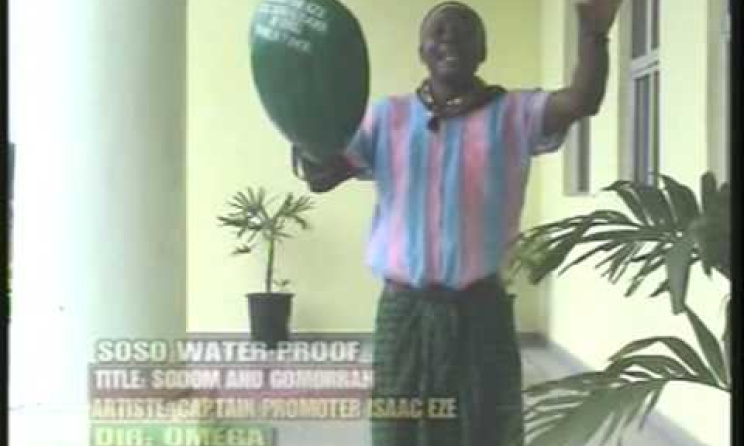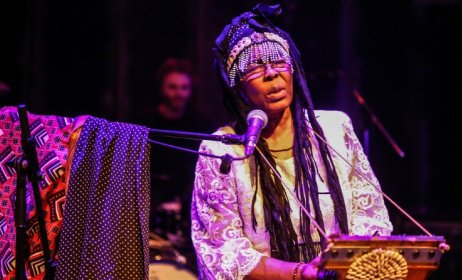A pilgrimage to the oldest existing musical instrument in Nigeria
Igbo-Ukwu is more popularly known by Art Historians, Historians and Archaeologists, as the site of Archaeological excavations carried out by the great Cambrdge Professor, Thurstan Shaw, between 1959 and 1964.
Shaw had discovered artefacts in sites in the small town, which had revealed an ancient civilisation dating back to 950 AD, in short over a 1000 years old, this having been established by the strict scientfic process of carbon-dating. Some of the discoveries had included the remains of an ancient King, whose regalia included precious stones, which could only have come from India or Egypt, complex, intricate art works in Bronze and Clay, swords, crowns, sceptres and Elephant Tusks amongst others. However this list left out one incredibly significant item (at least for us and our readers here at Music In Africa), an ancient Thumb Piano.
The five key Instrument, known in Igbo-land (where Igbo-Ukwu is located) by the indigenous name, 'Uba-Aka' or 'Ubo-Akwara', was crafted in bronze, which probably accounted for its having survived 1000 years of underground degradation. A medium-sized circular design, with the characteristic intricate patterns of the finds of Igbo-Ukwu, it was still in remarkably good condition, for its age and the conditions, it had endured. One other distinctive fact about this remarkable instrument being that it was by definition, the oldest existing musical instrument in Nigeria, there being no evidence of any older specimens anywhere else in the country.The thumb piano by the way, known more widely in Southern Africa as ‘Mbira’, is one of Africa’s oldest melodic instruments, with a verifiable history going back over 3000 years. It occupies a space that straddles, entertainment, sacred worship and indeed decorative art.
Professor Shaw had famously refused all overtures and pressure to render the Igbo-Ukwu finds to the British Museum, insisting that they either be retained by the town of Igbo-Ukwu as a sacred trust for its citizens, or some of the artefacts be handed over to the Nigerian National Commission for Museums and Monuments, as required by law. A substantial number of the artefacts were then warehoused at the National Museum Lagos, however a smaller number were retained at Igbo-Ukwu and eventually put on display at a Museum established by the Anambra State Government (with administrative responsibility for the town of Igbo-Ukwu), in the town itself. The ancient thumb piano, was one of such artefacts.
I visited the Museum in 2013, on a broad quest of understanding the story of Igbo-Ukwu and was priviledged to witness the ancient instrument in its fully glory. The word glory here being relative, since the surroundings of the Igbo-Ukwu Museum were less than befitting for such an august occupant as the venerable Ubo-Aka. Collapsed roofing, broken windows and a generally deficient structural environment were the sad back-drop to its display. These circumstances are however not a commentary on the Museum's staff, who were, and I understand still are, incredibly committed and hard-working. However all their passion and high work ethic cannot be a substitute for the lack of government funding required to restore the Museum and safeguard its fast-dwindling inventory of artefacts.
All this notwithstanding, the significance of the very existence of the Igbo-Ukwu thumb piano is such that it has survived far greater tests than its present predicament, and to all intents and purposes it shall outlast its keepers and all of us bystanders, who stand in awe of its pre-eminence in the present. The Igbo-Ukwu thumb piano, wiith its ancestral ties to several other similar instruments across, East, Central and Southern Africa, is a living, enduring piece of cultural and historical memorabilia, indicative of a great Pan-African musical heritage, which the writer personally feels needs celebration in as many formats as is possible. This article is a challenge. Its sheer longevity is another challenge to the present generation of the African music stakeholder group. Its stubborn survival is equally a silent, implied reminder of the need to further investigate what is clearly a common African musical heritage, going back over millenia even. In Igbo-land in particular, a long line of great practitioners of this instrument have enjoyed huge popularity over the last century, with names like the legends Ezigbo Obiligbo, Ozoemena Nsugbe, Promoter Eze, Jimmy Conter and the transvestite Area Scatter, coming to mind. As the saying goes, 'you can't stop the music.' This historical piece of Africa's musical heritage provides no better evidence of the truth in the saying.







































Comments
Log in or register to post comments